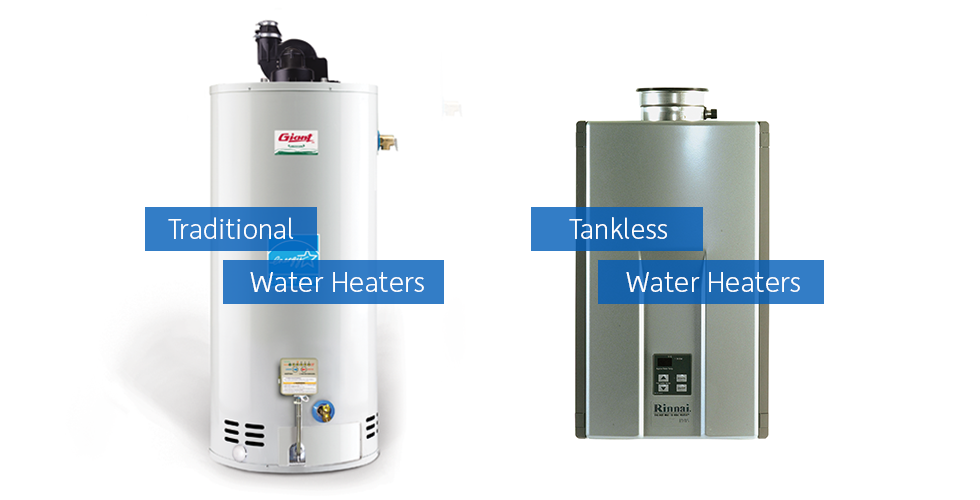Selecting a water heater
Overview
Our team of knowledgeable service advisors is trained to provide you with expert guidance on how to choose a water heater that best serves you, your family or your business.
In this section, we’ve outlined some basic considerations to help get you started.
We can arrange your installation with one of our qualified and reliable vendors. View a list of installers.

How you use hot water on a daily basis may dictate the type of water heater that is best for you and your family.
Stored water heater tanks
If your family turns their hot water on and off throughout the day – for example, to take showers, use the dishwasher or do laundry – you may benefit from a stored water heater tank.
Stored water heater tanks are large tanks that hold a reservoir of water. The water is heated continuously throughout the day to ensure you have a supply of hot water when you need it. As you use hot water, the tank is refilled with cold water.
If your water heater is not large enough, or you use too many fixtures or appliances at the same time, you may run out of hot water temporarily until your hot water tank is able to heat incoming water to the right temperature.
Best for...
- Families that turn hot water on and off throughout the day.
Advantages
- Provide immediate access to hot water.
- Don’t require bursts of energy every time you need hot water.
Drawbacks
- May run out of hot water if your tank is not large enough.
- Require energy to heat water continuously throughout the day.
- Are large and take up floor space.
Tankless water heaters
If your family needs a continuous flow of hot water one or two times a day – for example, if several members of your family shower one after the other – you may benefit from a tankless or “on demand” water heater.
Tankless water heaters are small devices that quickly heat up your water as you need it. Because tankless water heaters heat your water as it enters your home from a main water line, they offer an unlimited supply of hot water.
Best for...
- Families that need a continuous flow of hot water at one or two times during the day.
Advantages
- Can provide an endless supply of hot water.
- Don’t require energy to heat water continuously throughout the day.
- Are small and can be mounted on a wall.
Drawbacks
- Can be more energy draining and costly than stored hot water tanks if they are turned on and off too many times in a day.
- Delivery of hot water is slightly delayed every time you turn on a fixture or appliance.
- May create a “water sandwich” – a small amount of hot water in the pipes followed by cold water followed by unlimited hot water.
- Not available for customers on well water.
Sizing your water heater
How much water you use on a daily basis may dictate the size of your water heater.
Because stored hot water tanks have a limited capacity and take time to refill, they can run out of hot water if they are too small for the needs of you, your family or your business. It is important that you select a stored water heater that is matched to the size of your home and the number of appliances you use in a typical day.
Tankless water heaters pull and heat water on a continuous basis, so their size is not an issue. With a tankless water heater, you have access to an unlimited supply of hot water.
Energy source
Water heaters are built for a specific energy source. The source of energy you use to power your water heater will have an impact on your water heater setup, maintenance and ongoing costs.
Electric
- Lower monthly rental rate, but higher costs to operate
- No combustibles or venting
- Slow recovery
- Highest energy factor rating
Gas/Propane
- Slightly higher monthly rental rate, but lower costs to operate
- Must be vented outdoors, have very specific requirements for placement
- Faster recovery
- Slightly lower energy factor rating
Other considerations
Dimensions and clearance
Once you know the type and capacity of water heater that can best meet the needs of you, your family or your business, you must consider the unit's dimensions.
Your water heater should have clearance at the front, from the floor and on each side. The amount of clearance needed varies, depending on the water heater.
Location
You must also ensure the location of your water heater meets the requirements. Check if your water heater requires an exterior wall for ventilation, an electrical power source, a gas supply line or a water supply line. Placing your water heater in the right location is an effective way to reduce your installation costs.
Speak to one of our qualified service advisors about your water heater options. They can help assist you in finding a water heater that is matched to your home or business and water use.
Have you considered the benefits of renting your water heater locally? Learn how local water heater rentals benefit your family and community.